Description: Professional Plug-Ins for Apple
Final Cut Pro
Language: English and German
Requirements: FCP Version 1.2.1, 1.2.5 or 2.0
Price: CD -$179.00 USD + $10.00 shipping
Download -$174.00 USD
More Info: http://www.cgm-online.com
by Ned Soltz
Klaus Eiperle
is one of the few people on this planet who knows FX Builder.
This becomes evident in his collection of 56 filters and transitions
for FCP. In addition to the collection of filters and transitions,
the package also contains 67 softwipe patterns which can be used
with the CGM Softwipe or FCP Gradient Wipe transitions, or even
with Pixelan's SpiceMaster plug-in.
But even before looking at the specifics
of these plug-ins, I think it is important to understand the
importance of their being written in FX Builder. The CGM Transitions
and Filters function in a totally native manner by virtue of
having been written in FCP's native language. That means they
fully support YUV rendering as well as AltiVec and multiprocessing.
Furthermore, they are written in such a way as to support rendering
at the subpixel level. That ensures smooth movement within the
rendered clip. Finally, the 2D and 3D transitions are actually
transitions in an FCP sense rather than After Effects filters
which require a cut and paste job in order to function as a transition.
And then those AE filters may very well not render in YUV space,
causing luminance shifts in the final rendered product.
At first glance, it is easy to dismiss
the package as being redundant with many of the filters and transitions
already included in FCP. Why, you might ask, would you need another
Page Peel when there already is a Page Peel included in FCP?
First, Eiperle includes four different varieties of peels: page
peel, double page peel, 1/2 and 1/4 peels. Most significant,
though, are the additional parameters which this filter provides.
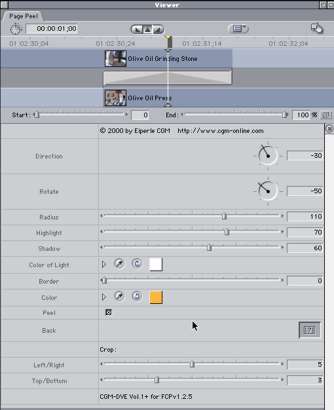
In this screen shot of the Page Peel
transition, note both direction and rotation can be controlled
as can highlight and shadow. This transition also allows for
setting a border and controlling its attributes. It is also possible
to crop the transition both top and bottom.
Compare the CGM controls with the Apple
Page Peel controls.
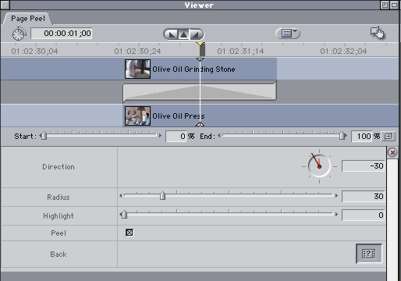
Both do have a well into which you can
drop a still or moving image to serve as a backing for the peel,
but the added number of CGM settings speak for themselves.
Similar observations could be made about
all of the transitions. To put it very simply, they simply do
more and give an editor a much wider range of creative choices.
An additional component of the Transitions
is a stronger implementation of FCP's Gradient Wipe, called Softwipe
in this package. I also need at this point to make reference
to Pixelan's Spice Master plug in. In all three of these implementations
of gradient wipe, it is possible to drop a wipe pattern into
the "well" in the effect controls window in FCP and
that pattern will effectively be the matte for the transition.
These can be created yourself in something like Photoshop or
purchased in Pixelan's excellent collection of thousands of gradients,
Video Spice Rack. CGM provides 67 "softwipe patterns"
or gradients with the package.
The FCP Gradient Wipe transition allows
essentially one control-the softness of the edge of the wipe.
Pixelan Spice Master does not require importing of the wipe pattern
into the browser, but contains within it links to the folder
in which you have saved your gradients. But Spice Master functions
as a filter, not a transition. Therefore, it requires a cut and
paste operation in order to act as a transition in FCP.
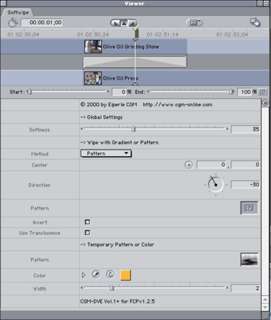
The CGM Softwipe transition, pictured
above, allows dropping a gradient in the top well and using a
color wipe to color that gradient or just using the gradient
as a gray scale only to matte the transition. Again, softness
is an important parameter in this kind of transition.
The screen shot below shows all of the
2D and 3D transitions which the package contains.
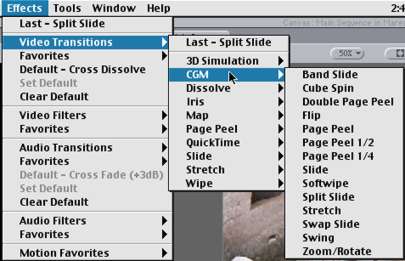
The strength of the product, though,
lies in its Video Filters.

Most notable of all of these is the White
Balance filter. We all have shot footage where our white levels
have been incorrect. It has been possible to salvage that footage
through adjustment of color levels, but CGM provides a White
Balance filter. Essentially, just apply the filter, click the
eyedropper tool in the filter control window, and sample an area
that you would consider the white point. Other controls allow
fine-tuning and balancing.
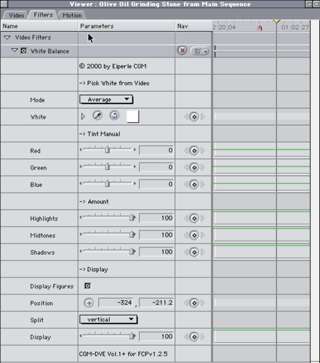
Here are before and after shots captured
from the Canvas window on my RGB monitor. Note in the before
picture, that there is a white t-shirt toward the upper right
of the image. That is what I sampled to be the white point of
this shot.

Note after sampling the white t-shirt
as the white point, the color balance of the image shifts.
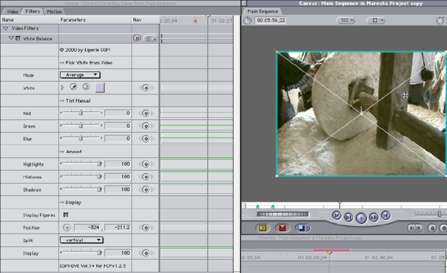
If there were any one reason to buy this
product it would be to take advantage of this White Balance filter.
These before and after shots say it all.
A similar filter for color correction
is the color balance filter. Again, you might say that FCP already
supplies a color balance filter. But the CGM Color Balance filter
allows you to split the screen to view the effects of the change.
Just this minor addition to the filter makes it more user friendly.

Another interesting filter is Replicate.
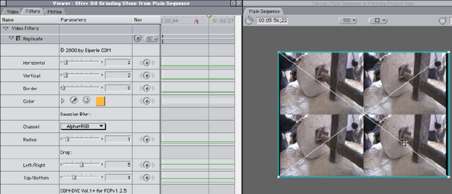
This filter allows for the creation of
a matrix of the clip with the ability to crop and size each "cell".
The effect can also be keyframed, allowing for some visually-interesting
possibilities.
Summary and Conclusion
This product works. It does what it purports
to do and it does it with seamless integration into FCP 1.2.5
and FCP 2.0. The most useful elements of these effects derive
from the additional parameters that they provide when compared
to the adjustment possibilities of comparable FCP filters. The
Softwipe transition is much more useful than FCP's Gradient Wipe
and accomplishes as a transition much of which Pixelan's SpiceMaster
accomplishes in its more awkward filter implementaton. The color
correction capabilities that the White Balance filter accomplishes
alone make the package a worthy tool for FCP editors.
Documentation is weak. It consists of
several HTML-based tutorials with a link to the CGM web site.
The English reads a tad German, but a little clean-up by an editor
would resolve some awkward sentence structure and conform the
language to more English style. These are minor points to me
since these are not complex special-effect plug-ins but are just
very solid implementation of editing basics.
The price point might be a little high
for many users. Even with additional controls for effects and
even with the color correction features, I fear that some users
might balk at spending an extra $199 with all of the other expenses
that this sometimes bottomless pit of hardware/software drains
from our pockets. On the other hand, the developer is one of
the only, if not the only, individual writing commercial packages
with FXBuilder. That alone deserves some consideration. Would
I buy it at $149? Maybe? Would I buy it at $99? Almost definitely.
Removing price considerations, the CGM
Transitions and Filters Volume 1 for Final Cut Pro is an outstanding
collection of plug-ins for FCP which truly can enhance ultimate
product.
To purchase Vol 1 Click HERE
Ned J. Soltz Ned Soltz is passionate about the
uses of technology to enhance the creative process. He only wishes
that he were more creative. Now that he has a mobile FCP studio
on his Powerbook G4, you can catch him on the road at nsoltz@aol.com.
copyright ©
Ned J. Soltz 2001
This article
first appeared on www.kenstone.net as is reprinted here
with permission
All screen captures and
textual references are the property and trademark of their creators/owners/publishers.